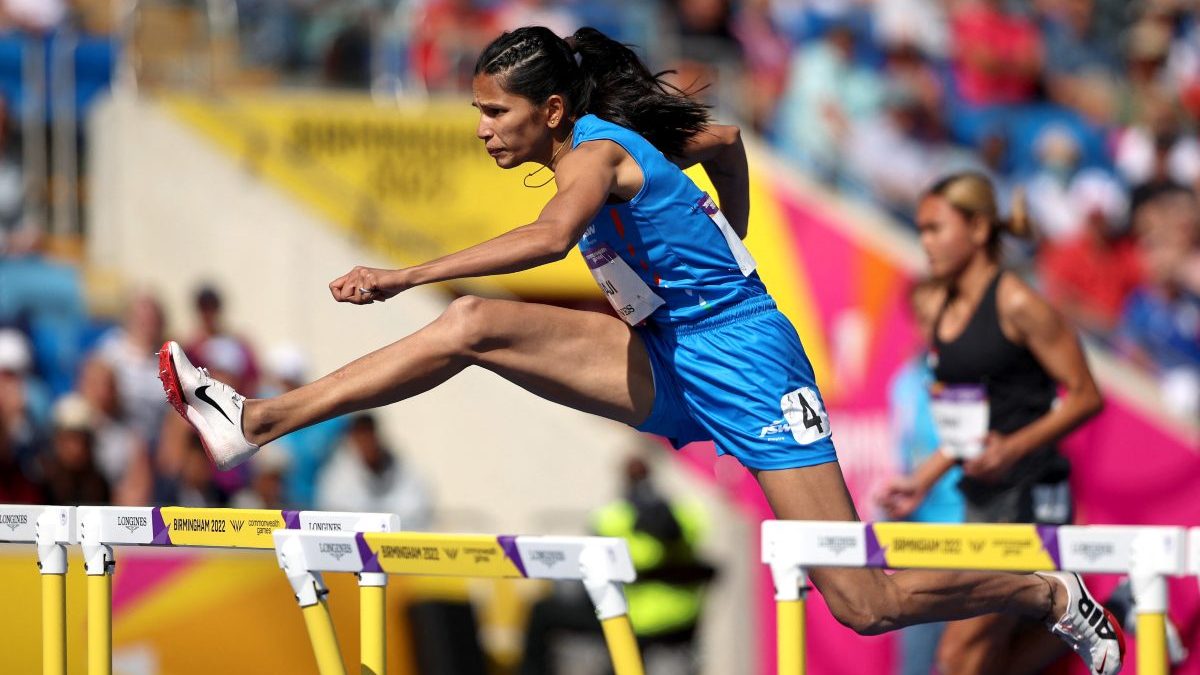Jyothi Yarraji will be the first Indian to compete in women’s 100m hurdles at Paris Olympics, but she needs to cut down around 25 microseconds during her debut Games to have a real chance of winning a medal. Here’ how she plans to do it. read more
)
Jyothi Yarraji will need to touch 12.5s timing at Paris Olympics to have any real chance of winning a medal. Reuters
History will be made regardless of medal win when Jyothi Yarraji takes the tracks in the Paris Olympics 2024. No Indian woman has ever competed at the Olympics in 100m hurdles, but the 24-year-old from Visakhapatnam is set to change that. Yarraji, who is an Asian Athletics champion and Asian Games silver medallist, made history by qualifying for the Paris Olympic Games through the world ranking quota.
The national record holder matched her personal best of 12.78s in May this year at the Monet Grand Prix in Finland but missed the direct Olympic qualification mark by just 0.1 seconds as she nearly tripped off the final hurdle.
Paris Olympics Complete Coverage: Click here for news, schedule, explainers and more
Nonetheless, Jyothi will be there in Paris when the women’s 100m hurdles event gets underway thanks to her implausible progress over the year that has seen her become the first Indian woman to register sub-13 timings besides holding the 15 fastest times ever run by an Indian in this category.
That trait will have to come to the fore for Jyothi to have any chance of converting her history-making appearance into a shining medal. The bronze in the women’s 100m hurdles was won with a timing of 12.55s at Tokyo 2020 and a conservative estimate says that the Indian racer will need to shave off at least 0.23 seconds from her current PB to have any real chance of landing an medal in athletics which has largely remained elusive for India.
Shaving off 0.23 seconds is no mean feat in athletics, especially in such a short span. To put things into context. Jyothi had a personal best of 13.03 in 2020 which came down by 0.25 seconds in 2023 and has stayed at the same level since then.
However, if there’s one thing that can help her cut down those unwanted seconds, it’s training efficiently and implementing all of that in the race.
Jyothi was close to breaking her national record in Finland a couple of months back before she hit the final hurdle in the race, leading to a hip flexor injury. She has recovered from the injury but her preparation for the Paris Games has included making adjustments to her running style including how she starts, under the guidance of her coach James Hillier, who is also the head coach of Reliance Odisha Athletics High-Performance Centre in Bhubaneswar.
After the Finland race, Jyothi switched to starting a race on the right leg instead of the left. Another change includes increasing the pace by taking seven steps to the first hurdle instead of eight.
“The reason why we made these changes is because she is a victim of her own success,” Hillier said during an online interaction arranged by the Reliance Foundation. “She is so fast and strong that she was getting in too close to the first hurdle, and she was chopping and then basically slowing down a little bit and sort of skying the first hurdle. And then it would affect her approach to the second and the third hurdle and was ruining her acceleration a little bit.”
Hillier, who earlier worked with British Athletics, added that adapting to the adjustments was initially tough for Jyothi but it has resulted in consistently improved results.
“It was difficult in one respect because she had to start with the other leg forward. That took a little bit of learning and getting used to, but it’s been something that’s worked well. It’s something that has helped her. She keeps improving and she keeps getting better because of this. She’s a lot more consistent now. She’s consistently running 12.8, 12.7, etc.”
Technical adjustments however are just one of the aspects of racing, how you feel on the race day is another major factor behind the eventual result.
During the interaction, Jyothi had no qualms in admitting that she is not “not an aggressive runner” but “a rhythmic runner”.
Hillier is currently focused on the same. On creating an environment with changes in hurdle placements or postures where she can feel the rhythm of finishing the race in 12.50s. The whole exercise is geared towards the hope that if Jyothi experiences the rhythm of running considerably faster than her personal best, then she may be able to deliver the same result at the Olympics.
“What I try to do is create an environment where I’m replicating the rhythms and the postures, as what I want from her in a perfect world situation. So, for example, let’s say her goal is to run 12.50 seconds. My job in training is to create an environment where she feels a 12.5 rhythm when she runs,” Hillier revealed. “There are various ways of doing that – by making the hurdles a bit lower or by increasing the spacing between the hurdles to allow her to get up to more higher speed.
“So I’m trying to get her to feel what a 12.50 rhythm is, because my belief is if she can feel that rhythm, then if everything is good and her body allows her, she’ll have a better chance to replicate that in a race.”
Besides efficient physical training, Olympic debutant Jyothi must also be in the best mind to execute the plans. The glamour of the world’s biggest sporting event or the weight of expectations like never before have often proved overwhelming for many athletes.
Jyothi, however, is not worried about the pressure of the Olympics.
Having already faced many difficulties hailing from a family of little income where her father, Suryanarayana, works as a private security guard and her mother, Kumari, as domestic help and also doubles up as a part-time cleaner in a hospital, the World University Games bronze medallist is well aware of what is to come and what she needs to do.
“So, the thing is, now I feel I am going to a war. So I have to be very, very, very good at what I’m doing. I don’t want to tell after the race the mistakes that happened. I want to fix it now. So that’s the reason I’m pushing my limits. Whatever it is possible for this stage and I’m trying to be the best,” she said.
The secret of her positive mindset? Her mother.
“My situation is really bad sometimes. My mom always told me to just keep going forward because we can’t stop the present, past and the future. She told me ‘You work for yourself, whatever the result it will come we will take it’. My mom will never tell me before a competition to win a medal, to win a gold. She will tell me to go and be healthy and be self-satisfied with whatever I am doing. That is why I always go forward with a positive mindset,” explained Jyothi.
Watching sports and writing about it are my favourite things in life and I try to bring you the best from the sporting world at Firstpost. see more

 1 month ago
108
1 month ago
108
)
)
)
)
)
)
)
)
)
)
)
)
)
)
)
)
)
)
)
)
)
)
)
)
)
 English (US) ·
English (US) ·